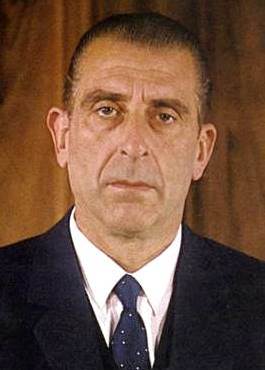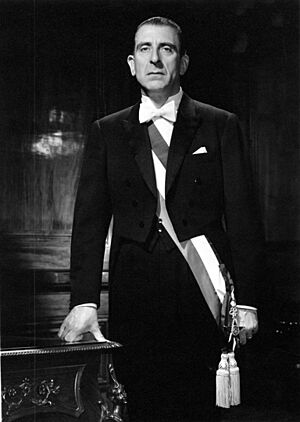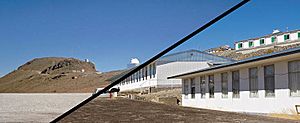Eduardo Frei Montalva facts for kids
Quick facts for kids
Eduardo Frei Montalva
OMCh
|
|
|---|---|

Official portrait, 1964
|
|
| 27th President of Chile | |
| In office 3 November 1964 – 3 November 1970 |
|
| Preceded by | Jorge Alessandri |
| Succeeded by | Salvador Allende |
| President of the Senate of Chile | |
| In office 23 May 1973 – 21 September 1973 |
|
| Preceded by | Américo Acuña Rosas (Acting) |
| Succeeded by | Gabriel Valdés |
| Personal details | |
| Born |
Eduardo Nicanor Frei Montalva
16 January 1911 Santiago, Chile |
| Died | 22 January 1982 (aged 71) Santiago, Chile |
| Resting place | Cementerio General de Santiago |
| Political party | Christian Democrat |
| Spouse |
María Ruiz-Tagle Jiménez
(m. 1935) |
| Children | Irene Carmen Isabel Mónica Eduardo Jorge Francisco |
| Signature |  |
Eduardo Frei Montalva was an important political leader from Chile. He was born on January 16, 1911, and passed away on January 22, 1982.
During his long career, he held many important roles. He was a Minister, a Senator, and even the President of the Senate. Most notably, he served as the 27th president of Chile from 1964 to 1970. His oldest son, Eduardo Frei Ruiz-Tagle, also became president of Chile many years later.
Frei's political party supported the military's action to remove his successor, Salvador Allende, from office in 1973. This happened after the Chamber of Deputies accused Allende of not following the country's constitution. Later, Frei became a strong voice against the military government led by Augusto Pinochet.
Contents
Early Life & Education
Eduardo Frei Montalva was born in Santiago, Chile, on January 16, 1911. His father, Eduard Frei Schlinz, was from Austria, and his mother was Victoria Montalva Martínez.
When he was three years old, his family moved to Lontué. His father worked there as an accountant at a winery. Eduardo attended public school in Lontué.
In 1919, his family moved back to Santiago. Eduardo went to a boarding school called Seminario Conciliar de Santiago. Later, he attended Instituto de Humanidades Luis Campino, where he finished school in 1928 at age 17.
In 1929, at 18, he started studying law at Universidad Católica. He graduated as a lawyer in 1933. He married María Ruiz-Tagle, and they had seven children together.
Becoming a Politician
Eduardo Frei Montalva started his political journey with the Conservative Party. However, in 1938, he and other young people created their own party called Falange Nacional.
In 1945, he became the Minister of Public Works. Four years later, in 1949, he was elected as a senator. That same year, he helped write a book about Chile's political parties.
In 1950, he traveled to New York as a representative for the United Nations (UN). In 1952, at 41, he ran for president for the first time.
Growing Influence
The 1952 election was won by Carlos Ibáñez del Campo. In 1954, the UN chose Frei to lead a group that wrote an important report on economic development in Latin America. This report helped with future studies on how countries in the region could grow and work together.
In 1956, he was elected Senator for Santiago, receiving the most votes. On July 27, 1957, his party, Falange Nacional, changed its name to the Christian Democratic Party of Chile. Frei Montalva became its main leader.
He ran for president again in 1958 but came in third place. During these years, he wrote several books about politics and society. He also gave many speeches and attended international conferences. In 1961, he was chosen to lead the First World Christian Democratic Party Congress, which took place in Santiago.
The 1964 Presidential Election
Frei ran for president a third time in 1964. His campaign used the slogan "Revolución en Libertad" (meaning "Revolution in Liberty"). He won by a large margin, getting 56% of the votes. He defeated Socialist candidate Salvador Allende, who received 39%. Frei took office on November 4, 1964.
His Time as President (1964-1970)
President Frei's government started many important changes in Chile. These included:
- "Promoción Popular" (Social Promotion): Helping people get involved in their communities.
- "Reforma Agraria" (Agrarian Reform): Changing how land was owned and used, giving more land to farmers.
- "Reforma Educacional" (Education Reform): Improving the school system.
- "Juntas de Vecinos" (Neighborhood Associations): Creating groups where neighbors could work together.
His government worked hard to reduce poverty. Wages for workers increased, especially in rural areas. By the end of his presidency, workers received a larger share of the country's wealth.
Social Improvements
Between 1964 and 1970, the number of students in schools increased by 46%. About 250,000 new houses were built, mostly for families in need. The government also built 20 new clinics and 16 hospitals between 1965 and 1969.
Frei's government also focused on helping local communities. They encouraged the creation of self-help groups, especially in poorer areas. By 1970, there were about 20,000 such groups, including mothers' centers, sports clubs, and youth groups. These efforts aimed to give people "a new form of life and hope."
Spending on education doubled, and the basic education period was extended from six to eight years. A two-shift school day was introduced to allow more students to attend. By 1970, 95% of children in the right age group were attending primary school.
New laws were also passed to provide insurance for work accidents and health insurance for employees. Basic health services were expanded, leading to a significant drop in infant deaths during the 1960s and 1970s.
Economic Changes
The government introduced new taxes to make the tax system fairer. Taxes as a percentage of the country's income increased from 12.8% in 1964 to 21.2% in 1970. Public spending also increased a lot, especially on education, agriculture, and housing.
A major focus was on improving conditions in the countryside. Farmers were allowed to form unions, and land reform was sped up. A law in 1967 allowed the government to take over large farms to redistribute land. This policy helped reduce the number of people living in poverty.
During his time, there were also some difficult incidents, including worker deaths at a mine and a protest in Puerto Montt. In 1969, there was a brief military demonstration known as the Tacnazo insurrection.
In 1965, President Frei traveled to many countries, including France, the United Kingdom, Germany, Italy, and the Vatican. He also visited several countries in Latin America, giving important speeches on international topics.
In 1966, the Andean Group was officially formed, which aimed to bring countries in the Andes region closer together. That same year, agreements were signed regarding Chile's copper industry, which was a major part of the country's economy.
On November 4, 1970, Eduardo Frei Montalva left office, and Salvador Allende became the new president.
Later Political Life
After Salvador Allende became president in 1970, Frei became concerned about the direction the country was taking. He believed Allende's government was trying to create a Communist system. In 1971, he gave speeches in the United States, saying that Allende's government was not following Chile's constitution.
In March 1973, Frei was elected Senator for Santiago and became the President of the Senate. This made him the leader of the opposition to Allende's government.
On September 11, 1973, the military took control of the government. Frei's Christian Democratic Party supported this action. They believed it was necessary because the Chamber of Deputies had accused Allende of violating the constitution.
After the military took power, Frei wrote a letter to an international Christian Democratic leader. In it, he explained why his party supported the military's intervention.
Opposing the Military Government
Between 1973 and 1977, Frei traveled to different countries and spoke at conferences. He also wrote books about history and the future of Latin America.
From 1977 to 1982, he was part of the Brandt Commission, a group led by Willy Brandt that discussed global issues. He attended meetings in many countries around the world.
Later, Eduardo Frei Montalva became a strong opponent of Augusto Pinochet's military government. He spoke out against Pinochet staying in power longer than planned.
Death and Investigation
In 1981, Frei was dealing with a stomach issue called chronic acid reflux. He had surgery for this condition. However, he died in Santiago on January 22, 1982, shortly after his 71st birthday. At the time, his death was said to be caused by an infection after the surgery. He was buried in the Cementerio General de Santiago.
Years later, investigations suggested that he might have been poisoned by the intelligence service of the military government. In December 2009, six people were arrested in connection with his death.
A report claimed that small amounts of harmful substances were given to Frei while he was in the hospital. These substances weakened his immune system, making it harder for him to recover from surgery.
The investigation continued, and in January 2019, the six suspects were found guilty of homicide and given prison sentences.
See also
 In Spanish: Eduardo Frei Montalva para niños
In Spanish: Eduardo Frei Montalva para niños
- Frei family
- List of unsolved deaths
Images for kids




